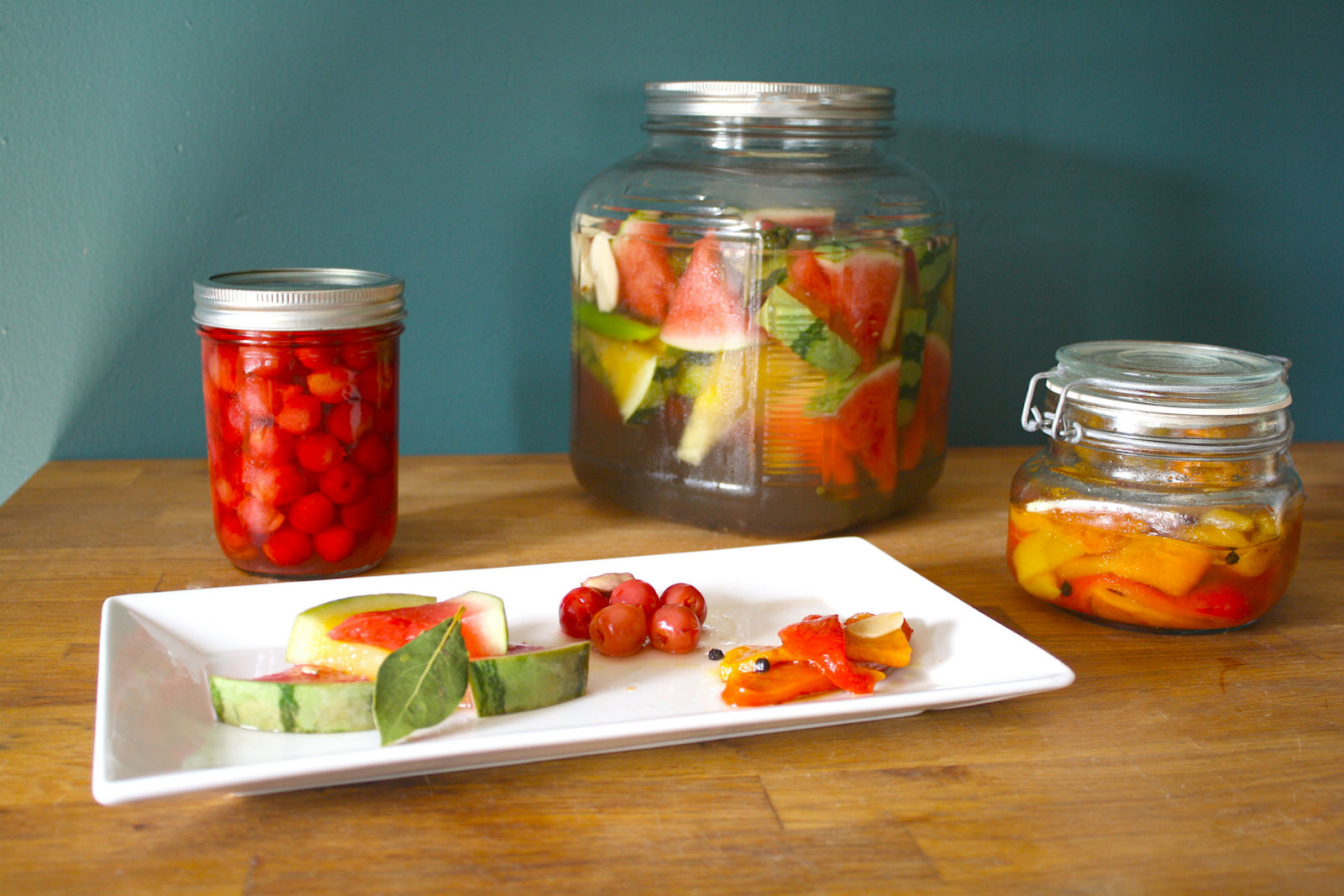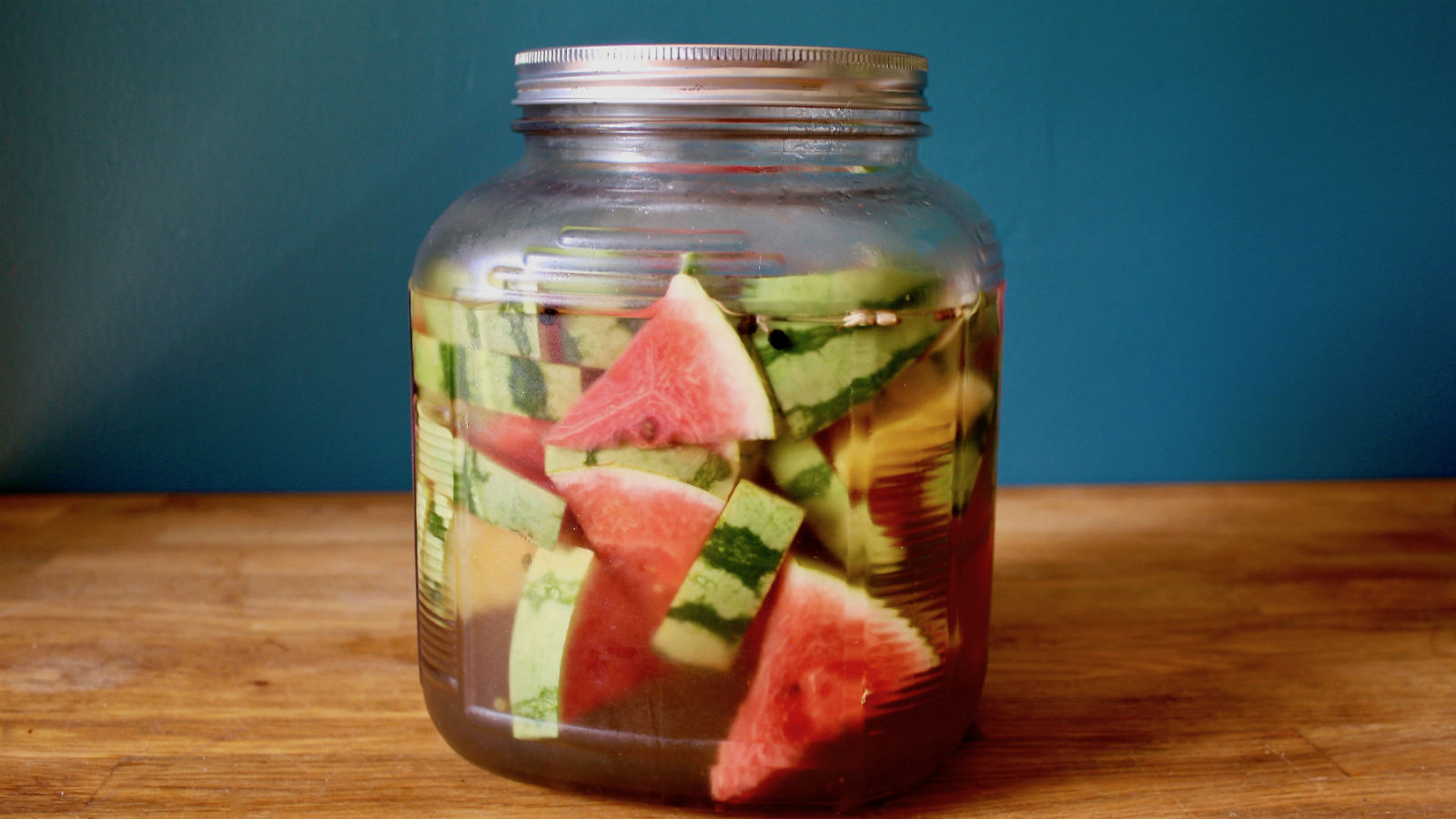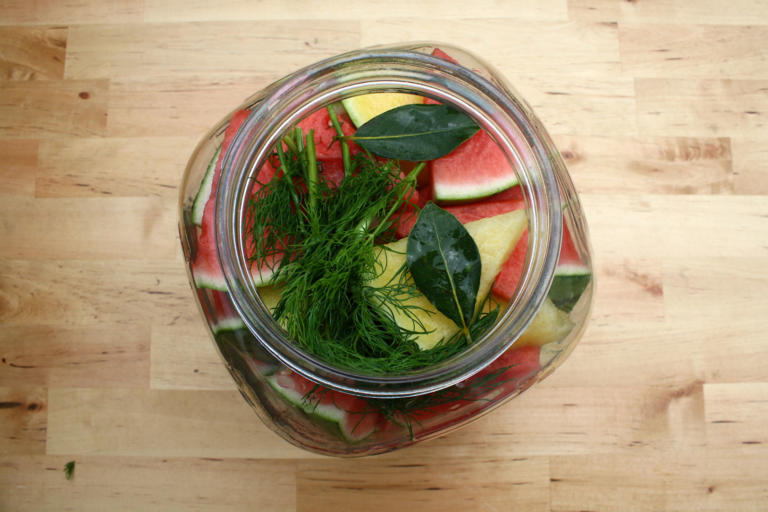When you are invited to a Russian person’s home you’ll likely enter the dining area to see a table laden with small plates of food. This type of spread is known as zakuski, which translates to “something to bite after.” Zakuski are essentially snacks that are meant to be eaten while drinking shots of vodka or other alcohol. Popular zakuski include smoked fish, cured meats, salads generously dressed with mayonnaise, blini and caviar, marinated mushrooms, and at least one kind of pickle. Pickled cucumber or cornichons are common, but so are all kinds of other pickled vegetables and fruits. Three of my favorite zakuski recipes are pickled sour cherries, peppers and watermelon.
Russians and Slavic people love pickles. Like many great culinary traditions, the practice of pickling and preserving was born out of necessity. The growing season for fresh fruit and vegetables is relatively short and it became essential to preserve the bounty of fresh produce for the dark cold days of winter. Historically, much of the food preservation used salt to pickle and/or ferment as opposed to using vinegar-based brines; this results in a saltier but less sour pickle.
Pickled and fermented produce are also valued for their health benefits. Fermented foods can aid digestion and help with good gut bacteria. This is particularly welcome when you’re eating rich and hearty foods.
Most importantly, pickles are flavorful. Pickled foods were particularly popular in Jewish communities in Russia and Eastern European, and often because they added bright acidity and strong flavors to complement staple bland foods like bread and potatoes. In fact, Eastern European Jews introduced dill pickles to America during the late 1800s and early 1900s when they began arriving in New York.
The Nosher celebrates the traditions and recipes that have brought Jews together for centuries. Donate today to keep The Nosher's stories and recipes accessible to all.
Pickled watermelon is a classic in Russia, Ukraine, Georgia and other Soviet countries. Russians typically add garlic, bay and dill to the brine, which makes the watermelon a savory treat. I love to serve it alongside cured meat or grilled sausages, and it also goes well as a pre-meal bite to eat alongside salty snacks served with ice cold vodka (or beer).

The technique described can be used on just about any kind of produce. The process for the watermelon quick pickle is simple and would work well for tomatoes, cauliflower, green beans and more. First you make a brine with a combination of salt, sugar and any aromatics you’d like. You pour the brine over the fruit or vegetables, and then refrigerate.
The pickles are ready the next day, but the longer they sit in the fridge, the deeper the flavors are developed. They last for months stored in the fridge… if you can go that long without eating all of them or sharing them with friends. There’s nothing quite like arriving at a table with many colorful dishes already laid out waiting for you to dig in. It’s an invitation to enjoy, relax and eat.
Note: The watermelon is ready to serve after 24 hours, but it is best if you wait 3-4 days before serving.
Russian-Style Pickled Watermelon
This savory pickle is a classic in Russia, Ukraine, Georgia and other Soviet countries.
- Total Time: 24 hours
Ingredients
- 1 (3-4 lb) watermelon
- ½ bunch of dill, stems on
- 4-5 cloves garlic, peeled
- 3-4 bay leaves (fresh if available)
- 2 small Serrano chilies (or 1 jalapeño), halved
- 6 cups filtered water
- ¼ cup kosher salt
- ¼ cup sugar
- 2 Tbsp white or apple cider vinegar
- 1 Tbsp peppercorns
Instructions
- Wash the watermelon very well, and then slice into desired pieces. I like mine about ¾-1” thick, and cut into small triangles with the rind still on.
- In a large glass jar or ceramic crock big enough to hold the watermelon slices, place the dill, garlic, a few of the bay leaves and the Serrano chili in the bottom. Layer the cut watermelon on top. If necessary, divide these ingredients among jars, and place the aromatics on the bottom of each jar.
- In a medium pot, combine the water, salt, sugar, vinegar and peppercorns. Bring up to a simmer, and heat until the salt and sugar is just dissolved. Pour the liquid over the watermelon in the jar(s). Top with the remaining bay leaves and a little more dill if desired. If the watermelon is floating above the liquid, you can weigh the fruit down by placing a small plate inside the jar with something heavy on top.
- Allow the mixture to fully cool, and then refrigerate for at least 24 hours.
Notes
The watermelon is ready to serve after 24 hours, but it is best if you wait 3-4 days before serving.
- Prep Time: 10 minutes
- Cook Time: 5 minutes
- Category: One-Pot
- Method: Quick
- Cuisine: Ashkenazi






Leave a Comment